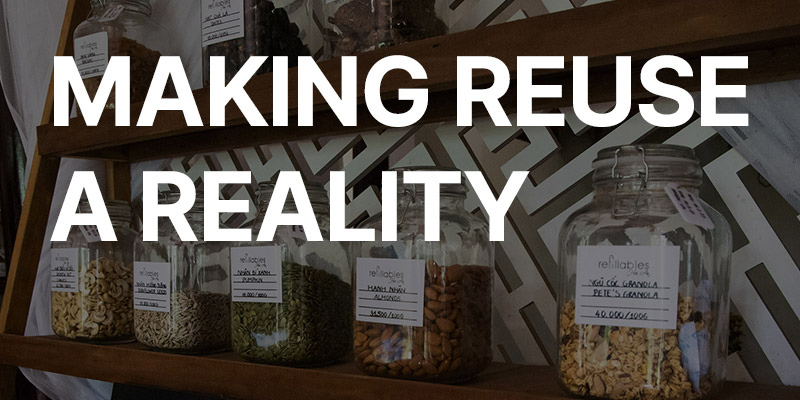30 May 2023 - A detailed plan to transform product packaging and significantly cut plastic production and pollution has been developed by researchers.
The study comes as government representatives meet in Paris to negotiate a legally binding global plastics treaty with a mandate to end plastic pollution.
The research, published today by the University of Portsmouth’s Global Plastics Policy Centre, commissioned by the Break Free From Plastic movement, consolidates 320 articles and papers, plus 55 new interviews with reuse experts from around the world [1], to suggest a universal definition of reuse systems and, for the first time, assess how all nations can move away from throw-away packaging.
Around a third (36%) of all plastic used globally goes into packaging, according to the United Nations, while around a third of all plastic packaging leaks into the environment. Reuse systems could cut plastic pollution by 30 percent by 2040.
The study found:
- A phased approach is needed to deliver economy-wide change from single-use to reusable packaging systems that can significantly reduce impacts on our climate, environment, biodiversity and health. Many reuse systems are already developed, proven and scalable. Fundamental to true reuse systems is packaging on loan to consumers that is returned multiple times until a sustainability ‘breakeven point’ is achieved.
- The upcoming global plastic treaty, being developed in Paris this week, is seen as a major opportunity for policymakers to support the upscaling of reuse systems, limit virgin plastic production, set standards and boost infrastructure. Virgin plastic reduction targets are 25 years behind carbon emissions targets, the reuse experts interviewed said.
- Next generation packaging should mostly be standardised, stackable and electronically tagged. It must be durable, lightweight, washable and non-toxic, but no one material is best suited to all situations.
- The path to mass adoption of reuse systems should roll out in four phases, the authors say, starting with large venues such as sports arenas and music festivals, which have breakthrough potential to build public acceptance, a challenge identified by three quarters (74%) of the reuse experts interviewed.
- Delivery firms will have a major role in the return and reuse economy, collecting used packaging while making deliveries.
The study envisages a world where all packaging is chipped or tagged and can be dropped into smart bins, cleaned and pooled at centralised ‘hubs’ before being delivered back to factories and retailers. Reuse systems will vary by sector, but the researchers think the transition will likely occur first in cities, where infrastructure is more adaptable. Widespread change will take time, the researchers concede, but closed environments like schools, hospitals, events and food courts are relatively easy to shift to zero waste packaging, as is the drinks sector, where some reuse brands already achieve high return rates. Harder will be the fast food sector where packaging often ends up scattered. ‘Rentable packaging’ could help, where customers order through apps and are charged a small fee if they do not return the packaging.
Most (82%) experts interviewed worry about higher costs and infrastructure change of reusable packaging, while many are also concerned about hygiene and loss of brand identity. Reuse supporters interviewed strongly criticise governments for lacking vision and over-investing in recycling and incineration, which are often barriers to reuse.
Director of the Global Plastics Policy Centre at the University of Portsmouth, Professor Steve Fletcher, said: “This study is a significant evidence based global assessment of how we can swap wasteful single use packaging for reuse systems. It shows that there is no one-size-fits-all packaging material or system for reuse, but we know that it has to fit seamlessly into people’s lives and that has huge untapped potential to end plastic pollution. What we need now is a clear vision for reuse and the right support to mainstream it.”
Break Free From Plastic global coordinator Von Hernandez said: “The scourge of single-use packaging continues to grow at a pace beyond the capacities of existing waste management systems. Prevention is key; ramping up reuse systems is the most sensible approach to replacing single use plastics and dramatically cut plastic production. The plastics treaty discussions this week must lay the groundwork for this transformation.”
Tiza Mafira, Executive Director Gerakan Indonesia Diet Kantong Plastik, said: “It is clear that reuse is much more than simply packaging, it is a system that needs all players in a global supply chain to take part. That’s why reuse needs to be right at the heart of the plastic treaty discussions this week, so that the operational nuts and bolts can be agreed and reuse can thrive and scale.”
ENDS
This report is here https://plasticspolicy.port.ac.uk/research/making-reuse-reality and https://www.breakfreefromplastic.org/reuse
Case studies of successful reuse systems are available on request.
Notes
[1] The researchers examined 320 academic journals, business policies, NGO reports and case studies and carried out 55 phone interviews with reuse and refill specialists, businesses, NGOs, multinational corporations, advocacy and community groups, divided almost equally between the Global North and South, between December 2022 and February 2023.
Contacts
University of Portsmouth communications officer Emma Gaisford
BFFP communications officer Bethany Spendlove Keeley
BFFP communications consultant Jack Hunter




